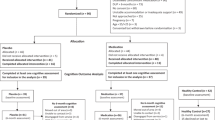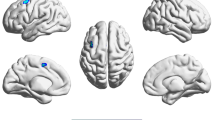Abstract
Background
Newer antipsychotic medications have been reported to enhance cognitive functioning in schizophrenia. Head to head studies with double-blind methods are still relatively few in number.
Objectives
To compare the relative cognitive enhancing effects of ziprasidone and olanzapine in the treatment of acutely ill inpatients with schizophrenia or schizoaffective disorder.
Procedures
In this 6-week, multicenter, double-blind, parallel-designed trial, patients were randomized to ziprasidone or olanzapine. No patient who had ever received a complete treatment trial with either of these medications previously was entered into the study. Cognitive testing measuring attention, motor speed, memory, executive functioning, and verbal skills were performed on all patients at baseline and endpoint.
Results
Treatment with either ziprasidone or olanzapine was associated with statistically significant improvements from baseline in attention, memory, working memory, motor speed, and executive functions. Treatment with olanzapine was also associated with a statistically significant improvement in verbal fluency. No statistically significant differences between these medications were found in the magnitude of improvement from baseline on any of the cognitive measures (other than verbal fluency in an exploratory analysis). Observed changes were not associated with changes in clinical symptoms measured using the PANSS or changes in movement disorders.
Conclusions
During 6 weeks of treatment, ziprasidone and olanzapine demonstrated substantial and comparable cognitive-enhancing effects relative to previous treatment. These effects were noted in all aspects of cognitive functioning previously proven to predict functional outcome in schizophrenia. No overall differences were detected between the medications in terms of the extent of cognitive enhancement.
Similar content being viewed by others
References
Barnes TRE (1989) A rating scale for drug-induced akathisia. Br J Psychiatry 154:672–676
Bilder RM, Goldman RS, Robinson D, et al (2000) Neuropsychology of first-episode schizophrenia: initial characterization and clinical correlates. Am J Psychiatry 157:549–559
Bilder RM, Goldman RS, Volavka J, et al (2002) Neurocognitive effects of clozapine, olanzapine, risperidone, and haloperidol in patients with chronic schizophrenia or schizoaffective disorder. Am J Psychiatry 1259:1018–1028
Blyler CR, Gold JM (2000) Cognitive effects of typical antipsychotic medication treatment: another look. In: Sharma T, Harvey PD (eds) Cognition in schizophrenia. Oxford University Press, Oxford, pp 241–265
Buchanan RW, Holstein C, Breier A (1994) The comparative efficacy and long-term effect of clozapine treatment on neuropsychological test performance. Biol Psychiatry 36:717–725
Cornblatt BA, Lenzenweger MF, Erlenmeyer-Kimling L (1989) The continuous performance test, identical pairs version. II. Contrasting attentional profiles in schizophrenic and depressed patients. Psychiatry Res 29:65–85
Davidson M, Reichenberg A, Rabinowitz J, et al (1999) Behavioral and intellectual markers for schizophrenia in apparently healthy male adolescents. Am J Psychiatry 156:1328–1335
Friedman JI, Harvey PD, McGurk SR, White L, Parrella M, Raykov T, Coleman T, Adler DN, Davis KL (2002) Correlates of change in functional status in institutionalized geriatric schizophrenic patients: focus on medical co-morbidity. Am J Psychiatry 159:1388–1394
Gladsjo JA, Schuman CC, Evans JD, Peavy GM, Miller SW, Heaton RK (1999) Norms for letter and category fluency: demographic corrections for age, education, and ethnicity. Assessment 6:147–178
Green MF (1996) What are the functional consequences of neurocognitive deficits in schizophrenia? Am J Psychiatry 153:321–330
Green MF, Marshall BD Jr, Wirshing WC, Ames D, Marder SR, McGurk S, Kern RS, Mintz J (1997) Does risperidone improve verbal working memory in treatment resistant schizophrenia? Am J Psychiatry 154:799–804
Green MF, Kern RS, Braff D, et al (2000) Neurocognition and functional outcome in schizophrenia: are we measuring the right stuff? Schizophr Bull 26:119–136
Green MF, Marder SR, Glynn SM, et al (2002) The neurocognitive effects of low-dose haloperidol: a two-year comparison with risperidone. Biol Psychiatry 51:972–978
Harvey PD, Keefe RSE (2001) Interpreting studies of cognitive change in schizophrenia with novel antipsychotic treatment. Am J Psychiatry 158:176–184
Harvey PD, Howanitz E, Parrella M, White L, Davidson M, Mohs RC, Hoblyn J, Davis KL (1998) Symptoms, cognitive functioning, and adaptive skills in geriatric patients with lifelong schizophrenia: a comparison across treatment sites. Am J Psychiatry 155:1080–1086
Harvey PD, Moriarty PJ, Serper MR, et al (2000) Practice-related improvement in information processing with novel antipsychotic treatment. Schizophr Res 46:139–148
Harvey PD, Heaton RK, Palmer B, Mohammed S, Kennedy J, Brickman A (2002) Stability of cognitive impairment in elderly schizophrenic patients receiving conventional antipsychotic treatment (abstract). J Clin Psychiatry 63:1065
Harvey PD, Green MF, McGurk SR, Meltzer HY (2003a) The cognitive effects of risperidone and olanzapine in patients with schizoaffective disorder or schizophrenia. Psychopharmacology 169:404–411
Harvey PD, Meltzer HY, Simpson GM, Potkin S, Loebel A, Siu C, Romano SJ (2003b) Improvement in cognitive function following a switch to ziprasidone from conventional antipsychotics, olanzapine, or risperidone in outpatients with schizophrenia. Schizophr Res (in press)
Heaton RK, Chelune CJ, Talley JL, Kay GG, Curtiss G (1993) Wisconsin card sorting test manual, revised and expanded. Psychological Assessment Resources, Odessa, FL
Heaton R, Paulsen JS, McAdams LA, et al (1994) Neuropsychological deficits in schizophrenics. Relationship to age, chronicity, and dementia. Arch Gen Psychiatry 51:469–476
Hegarty JD, Baldessarini RJ, Tohen M (1994) One hundred years of schizophrenia: a meta-analysis of the outcome literature. Am J Psychiatry 151:1409–1416
Heinrichs RW, Zakzanis KK (1998) Neurocognitive deficits in schizophrenia: a quantitative review of the evidence. Neuropsychology 12:426–445
Kay SR (1991) Positive and negative syndromes in schizophrenia. Brunner/Mazel, New York
Keefe RSE, Perkins S, Silva SM, Lieberman JA (1999) The effect of atypical antipsychotic drugs on neurocognitive impairment in schizophrenia: a review and meta-analysis. Schizophr Bull 25:201–222
Lee MA, Thompson PA, Meltzer HY (1994) Effects of clozapine on cognitive function in schizophrenia. J Clin Psychiatry 55:82–87
Lezak MD (1997) Neuropsychological assessment, 3rd edn. Oxford University Press, New York
Palmer BW, Heaton RK, Paulsen JS, Kuck J, Braff D, Harris MJ, Zisook S, Jeste D (1997) Is it possible to be schizophrenic and neuropsychologically normal? Neuropsychology 11:437–447
Patterson TL, Goldman S, McKibbin CL, Hughs T, Jeste DV (2001) UCSD performance-based skills assessment: development of a new measure of everyday functioning for severely mentally ill adults. Schizophr Bull 27:235–245
Purdon SE, Jones BD, Stip E, et al (2000) Neuropsychological change in early phase schizophrenia during 12 months of treatment with olanzapine, risperidone, or haloperidol. The Canadian Collaborative Group for research in schizophrenia. Arch Gen Psychiatry 57:249–258
Reitan RM, Wolfson D (1993) The Halstead-Reitan neuropsychological test battery: theory and clinical interpretation, 2nd edn. Neuropsychology Press, Tucson
Robinson DG, Werner MG, Alvir JM, et al (1999) Predictors of treatment response from a first episode of schizophrenia or schizoaffective disorder. Am J Psychiatry 156:544–549
Rund BR (1998) A review of longitudinal studies of cognitive functions in schizophrenia patients. Schizophr Bull 24:425–435
Simpson GS, Glick ID, Weiden PJ, Romano SJ, Siu CO (2003) Randomized, controlled double-blind multicenter comparison of the efficacy and tolerability of ziprasidone versus olanzapine in acutely ill inpatients with schizophrenia or schizoaffective disorder. Am J Psychiatry (in press)
U.S. Department of Health, Education, and Welfare (1976) The abnormal involuntary movement scale. Publication ADM76-338. U.S. Department of Health, Education, and Welfare, Rockville, Maryland
Velligan DI, Mahurin RK, Diamond PL, Hazleton BC, Eckert SL, Miller AL (1997) The functional significance of symptomatology and cognitive function in schizophrenia. Schizophr Res 25:21–31
Velligan DI, Newcomer J, Pultz J, Csernansky J, Hoff AL, Mahurin R, Miller AL (2002) Does cognitive function improve with quetiapine in comparison to haloperidol? Schizophr Res 53:239–248
Acknowledgements
This research was supported by Pfizer, Inc. The authors acknowledge and thank the following co-investigators: W.M. Abi-Saab, M.D., and J. Krystal, M.D. (Yale University School of Medicine, New Haven, CT); A. Aleem, M.D. (Anxiety Disorders Institute of Atlanta, Atlanta, GA); E. Allan M.D. (Hudson Valley VA Health Care System, Montrose, NY); J. Ananth, M.D. (University of California Harbor/UCLA Medical Center, Torrance, CA); M. Bari, M.D. (Synergy Clinical Research Center, Chula Vista, CA); R. Brenner, M.D. (Neurobehavioral Research, Inc. Lawrence, NY); J.M. Carr, M.D. (Affiliated Research Institute, Loma Linda, CA); F. Centorrino, M.D. (Bipolar and Psychotic Disorders Program, Belmont, MA); S. Cheren, M.D. (Access Clinical Trials, Natick, MA); J.E. Cueva, M.D. (St. Vincent’s Hospital and Medical Center, New York, NY); G. Ramanath, M.D. (Innovative Clinical Solutions, Ltd., Washington, Falls Church, VA); A.M. Freeman III, M.D. (The Psychopharmacology Research Clinic, Shreveport, LA); W.C. Fuller, M.D. (USD School of Medicine, Sioux Falls, SD); A.J. Gelenberg, M.D. (The University of Arizona Health Sciences Center, Tucson, AZ); G. Grossberg, M.D. and H. Asif, M.D. (St. Louis University, St. Louis, MO); H. Harsch, M.D. (The Medical College of Wisconsin, Milwaukee, WI); R. Horne, M.D. (Lake Mead Hospital, Las Vegas, NV); T.K. Johnson, PharmD (California Neuropsychopharmacology Clinical Research Institute (CNRI), San Diego, CA); P. Keck, M.D. (Psychiatric Professional Services, Inc., University of Cincinnati, OH); M.A. Knesvich, M.D. (St. Paul Medical Center, Dallas, TX); M. Levy, M.D. (Staten Island University Hospital, New York, NY); A.F. Lowy, M.D. (Comprehensive NeuroScience, Inc., Washington, DC); H. Meltzer, M.D. (Psychiatric Hospital at Vanderbilt University, Nashville, TN); C.H. Merideth, M.D. (Affiliated Research Institute, San Diego, CA); R. Pearlman, M.D. (Sisters of Charity Medical Center, Staten Island, NY); M.G. Plopper, M.D. (Sharp Mesa Vista Hospital, San Diego, CA); T. Reid, M.D. (ICSL Clinical Studies, Melbourne, FL); S. Riggio, M.D. (Mount Sinai Medical Center, New York, NY); S. Risch, M.D. (Medical University of South Carolina, Charleston, SC); M. Roffman, Ph.D., MBA (ClinSearch, Inc., Summit, NJ); B. Rosen, M.D. (North Shore Psychiatric Consultants, Smithtown, NY); D. Sack, M.D. (The Institute for Psychopharmacology Research of Orange County, Cerritos, CA); F.W. Schaerf, M.D., Ph.D. (Medical Studies Florida, Fort Meyers, FL); R.T. Segraves, M.D. (MetroHealth Medical Center, Cleveland, OH); R. Steinbook, M.D. (University of Miami/Jackson Memorial Medical Center, Miami, FL); A.A. Sugerman, M.D. (Princeton Biomedical Research, P.A., Princeton, NJ); J. Wolberg, M.D. (Mount Sinai Medical Center, New York, NY); L.W. Adler, M.D. (Clinical Insights, Inc., Glen Burnie, MD); N. Bark, M.D. (Bronx Psychiatric Center, Bronx, NY); I. Berman, M.D. (Taunton State Hospital, Taunton, MA); D. Garver, M.D. (Dallas Veterans Affairs Medical Center, Dallas, TX); M.R. Gershberg, M.D. (North General Hospital, New York, NY); R.E. Gur, M.D., Ph.D. (University of Pennsylvania Medical Center Neuropsychiatry Program, Philadelphia, PA); R. Mofsen, D.O. (Clinical Research Associates, P.C., St. Louis, MO); J.J. Pahl, M.D., FCP (Pahl Brain Associates, P.C., Oklahoma City, OK); J.D. Raese, M.D. (Dr. Raese and Associates, Riverside, CA); S. Targum, M.D. (Clinical Studies, Philadelphia, Philadelphia, PA); N.W. Telew, M.D. (Oregon Center for Clinical Investigations, Inc. Eugene, OR); S. Vivek, M.D. (Jamaica Hospital Medical Center, Jamaica, NY); A. Winokur, M.D. (University of Connecticut, Farmington, CT); D. Zimbroff, M.D. (Pacific Clinical Research, Upland, CA).
Author information
Authors and Affiliations
Corresponding author
Rights and permissions
About this article
Cite this article
Harvey, P.D., Siu, C.O. & Romano, S. Randomized, controlled, double-blind, multicenter comparison of the cognitive effects of ziprasidone versus olanzapine in acutely ill inpatients with schizophrenia or schizoaffective disorder. Psychopharmacology 172, 324–332 (2004). https://doi.org/10.1007/s00213-003-1652-2
Received:
Accepted:
Published:
Issue Date:
DOI: https://doi.org/10.1007/s00213-003-1652-2




